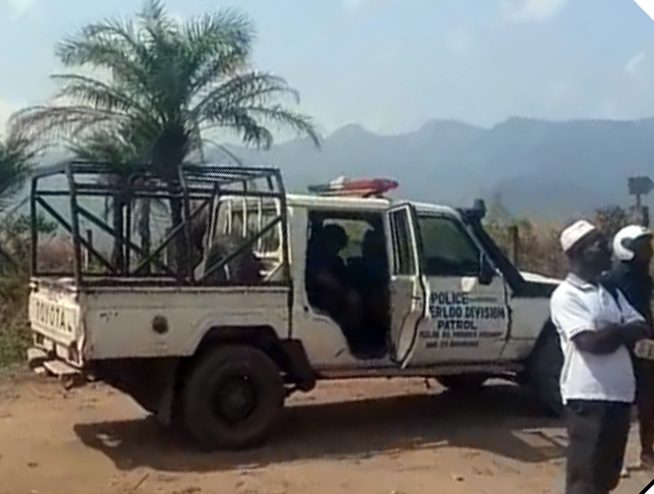
First Published on November 28, 2020.
By Mahmud Tim Kargbo.
Kerry Town Headman (Misbao Kamara) said dozens of Sierra Leone Police officers from the Waterloo Post Office, Police Station, charged into a group of youth standing near an intersection in Gbadi, Kerry Town, and arrested several of them, in a chaotic scene that stunned other onlookers. Saidu Kamara, Kerry Town Youth Chairman, said they were protesting to resist AIG Patrick A. T. Johnson from surveying the land they alleged he grabbed from the Fahnbulleh Family. As the group was protesting, officers confronted them. Pictures of the police action circulated widely, prompting sharp criticism from elected officials, activists, and on social media that the officers had used unnecessary force in a purely civil matter. Residents at Kerry Town said several youths that appeared to be filming the officers were arrested or chased into the bush.
Speaking to me on condition of anonymity, a source at Waterloo Post Office, Police Station, said that officers were responding to a “large disorderly group obstructing AIG Patrick A. T. Johnson from surveying the land in question.” The source added that people were often taken into custody, but they’ve never taken statements from them or charged them in court. The source confirmed that officers at the said police station often responded to the Kerry Town land issue after receiving noisy complaints from their boss. However, the source refused to say who this boss is. Other stakeholders said the police did not appear to be provoked before they rushed into the protesting youth. They said protesters did not appear to be lawless, and they did see people tripping and falling as they scrambled to get away from the area. “ln addition to the disproportionate response, it was totally unprovoked,” they said. They concluded, “The bottom line is that bystanders and peaceful protesters at Gbandi, Kerry Town, protesting against AIG Patrick A.T. Johnson from surveying their personal land which he now grabbed, were charged at by police and thrown to the ground in a really disturbing escalation of force by law enforcement.”
As a matter of public policy and constitutional law, one would expect that the conduct of AIG Patrick A.T. Johnson would be subject to strong condemnation. Indeed, a pictorial portrayal of the event at Gbadi, Kerry Town, would probably inspire reactions similar to those generated in other democratic dispensations when police are abusing the rights of their nationals. Yet, in Sierra Leone’s real world of civil rights litigation and police administration, are we still expecting to find just the opposite under the “New Direction” government of President Bio? A good deal of the misconduct may not be remediable in the courts and, as an internal administrative matter, little if any evaluative or disciplinary action would be taken against AIG Patrick A. T. Johnson and other officers in the Kerry Town abuse of power. In fact, as we will see, their actions were a predictable result of police policies and legal doctrine that subordinate individual rights to police power.
It is unlikely that the Sierra Leone Police command officials would critically look into the Kerry Town abuse by one of their senior officers. It is also unlikely that the “Force for Good” would take remedial action against one of their senior officers. The failure of the Sierra Leone Police Force to evaluate practices such as the “use of intimidation and harassment” by one of their very senior officers against civilians undermines individual officer accountability by providing implicit departmental approval of these questionable practices.
The department’s failure to investigate allegations of abuse, or to impose appropriate punishment, would lead the reasonable police officer to assume that even repeated violations of citizens’ rights would be condoned within the department. The failure to hold AIG Patrick A. T. Johnson and other officers at the Kerry Town abuse accountable for their prior misconduct is a direct link to the abuse of the Fahnbulleh family. The deleterious consequences of the department’s failure to monitor and discipline these officers run far wider than the encouragement it might give them to continue to abuse civilians. The message that violence and abusive conduct will be ignored is also sent to every other officer on the force.



